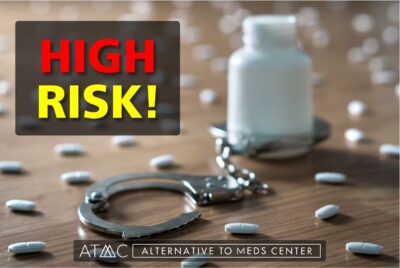1. Otani K, Tanaka O, Kaneko S, Ishida M, Yasui N, Fukushima Y, “Mechanisms of the development of trazodone withdrawal symptoms.” International Clinical Pharmacology Journal [Internet] 1994 Summer [cited 2023 May 8]
2. Jarema M, Dudek D, Landowski J, Heitzman J, Rabe-Jablonska J, Rybakowski J, “Trazodon — the antidepressant: mechanism of action and its position in the treatment of depression.” Polish Journal of Psychiatry 2011 Jul-Aug [cited 2023 May 8]
3. FDA trazodone label, “Highlights of Prescribing Information“, Revised 2017 Jun [cited 2023 May 8]
4. Jaffer KY, Chang T, Vanle B, Dang J, Steiner A, Loera N, et al., “Trazodone for Insomnia: A Systematic Review.” Innovations in Clinical Neuroscience 2017 Jul-Aug [cited 2023 May 8]
5. Mendelson W, “A review of the evidence for the safety of trazodone in insomnia.” Journal of Clinical Psychiatry 2005 Apr [cited 2023 May 8]
6. Shin JJ, Saadabadi A. Trazodone. [Updated 2020 May 28]. In: StatPearls [Internet]. Treasure Island (FL): StatPearls Publishing; 2021 Jan-.Available from: https://www.ncbi.nlm.nih.gov/books/NBK470560/ [cited 2023 May 8]
7. Knobler HY, Itzchaky S, Emanuel D, Mester R, Maizel S. Trazodone-induced mania. Br J Psychiatry. 1986 Dec;149:787-9. doi: 10.1192/bjp.149.6.787. PMID: 3790881 [cited 2023 May 8]
8. Henssler J, Heinz A, Brandt L, Bschor T. Antidepressant Withdrawal and Rebound Phenomena. Dtsch Arztebl Int. 2019 May 17;116(20):355-361. doi: 10.3238/arztebl.2019.0355. PMID: 31288917; PMCID: PMC6637660. [cited 2023 May 8]
9. Montalbetti D, Zis A, “Cholinergic Rebound Following Trazodone Withdrawal.” Journal of Psychopharmacology Feb 88 Vol 8 Issue 1 P.73 [cited 2023 May 8]
10. Lejoyeux M, Adès J. Antidepressant discontinuation: a review of the literature. J Clin Psychiatry. 1997;58 Suppl 7:11-5; discussion 16. PMID: 9219488. [cited 2023 May 8]
11. Lerner A, Klein M, “Dependence, withdrawal, and rebound of CNS drugs – an update.” Oxford Academic Journal: Brain Communications Vol 1 Issue 1 2019 [cited 2023 May 8]
12. FDA label Oleptro (trazodone hydrochloride) extended release tablets [Feb 2010] [cited 2023 May 8]
13. Hengartner MP, Schulthess L, Sorensen A, Framer A. Protracted withdrawal syndrome after stopping antidepressants: a descriptive quantitative analysis of consumer narratives from a large internet forum. Ther Adv Psychopharmacol. 2020;10:2045125320980573. Published 2020 Dec 24. doi:10.1177/2045125320980573 [cited 2023 May 8]
14. Bossini L, Coluccia A, Casolaro I, Benbow J, Amodeo G, De Giorgi R, Fagiolini A. Off-Label Trazodone Prescription: Evidence, Benefits and Risks. Curr Pharm Des. 2015;21(23):3343-51. doi: 10.2174/1381612821666150619092236. PMID: 26088119. [cited 2023 May 8]
15. Schwasinger-Schmidt TE, Macaluso M. Other Antidepressants. Handb Exp Pharmacol. 2019;250:325-355. doi: 10.1007/164_2018_167. PMID: 30194544. [cited 2023 May 8]
16. Gonçalo AMG, Vieira-Coelho MA. The effects of trazodone on human cognition: a systematic review. Eur J Clin Pharmacol. 2021 Jun 7:1–15. doi: 10.1007/s00228-021-03161-6. Epub ahead of print. PMID: 34097124; PMCID: PMC8182348. [cited 2023 May 8]
17. Fagiolini A, Comandini A, Catena Dell’Osso M, Kasper S. Rediscovering trazodone for the treatment of major depressive disorder. CNS Drugs. 2012 Dec;26(12):1033-49. doi: 10.1007/s40263-012-0010-5. Erratum in: CNS Drugs. 2013 Aug;27(8):677. PMID: 23192413; PMCID: PMC3693429. [cited 2023 May 8]
18. Lefkowitz D, Kilgo G, Lee S. Seizures and Trazodone Therapy. Arch Gen Psychiatry. 1985;42(5):523. doi:10.1001/archpsyc.1985.01790280105012 [cited 2023 May 8]
19. Volpi-Abadie J, Kaye AM, Kaye AD. Serotonin syndrome. Ochsner J. 2013;13(4):533-540. [cited 2023 May 8]
20. Bijl D. The serotonin syndrome. Neth J Med. 2004 Oct;62(9):309-13. PMID: 15635814. [cited 2023 May 8]
21. Bossini L, Casolaro I, Koukouna D, Cecchini F, Fagiolini A. Off-label uses of trazodone: a review. Expert Opin Pharmacother. 2012 Aug;13(12):1707-17. doi: 10.1517/14656566.2012.699523. Epub 2012 Jun 20. PMID: 22712761. [cited 2023 May 8]
22. FDA label Trazodone hydrochloride tablets for oral use. Approval 1981 [cited 2023 May 8]
23. Jackson E, Shoemaker R, Larian N, Cassis L. Adipose Tissue as a Site of Toxin Accumulation [published correction appears in Compr Physiol. 2018 Jun 18;8(3):1251]. Compr Physiol. 2017;7(4):1085-1135. Published 2017 Sep 12. doi:10.1002/cphy.c160038 [cited 2023 May 8]
24. Roth AJ, McCall WV, Liguori A. Cognitive, psychomotor and polysomnographic effects of trazodone in primary insomniacs. J Sleep Res. 2011 Dec;20(4):552-8. doi: 10.1111/j.1365-2869.2011.00928.x. Epub 2011 May 30. PMID: 21623982; PMCID: PMC3165092. [cited 2023 May 8]
25. Friedmann PD, Rose JS, Swift R, Stout RL, Millman RP, Stein MD. Trazodone for sleep disturbance after alcohol detoxification: a double-blind, placebo-controlled trial. Alcohol Clin Exp Res. 2008;32(9):1652-1660. doi:10.1111/j.1530-0277.2008.00742.x [cited 2023 May 8]
26. Bryant SG, Ereshefsky L. Antidepressant properties of trazodone. Clin Pharm. 1982 Sep-Oct;1(5):406-17. PMID: 6764164.[cited 2023 May 8]

 Trazodone has a relatively short half-life that is estimated to range somewhere between 3 and 9 hours, or longer. Trazodone withdrawal symptoms may begin within a day or a day and a half of the last dose. These figures do not apply to a time-release version of the drug such as Desyrel Dividose time-release tablets as the mechanism of action is different.
Trazodone has a relatively short half-life that is estimated to range somewhere between 3 and 9 hours, or longer. Trazodone withdrawal symptoms may begin within a day or a day and a half of the last dose. These figures do not apply to a time-release version of the drug such as Desyrel Dividose time-release tablets as the mechanism of action is different. Alternative to Meds Center’s medical staff has refined the trazodone withdrawal treatment process both during and after slow and safe
Alternative to Meds Center’s medical staff has refined the trazodone withdrawal treatment process both during and after slow and safe 







